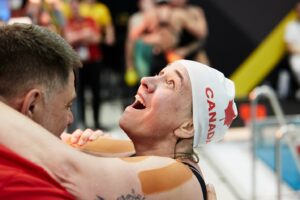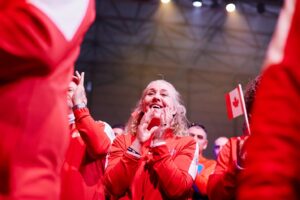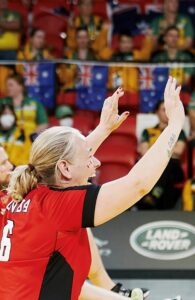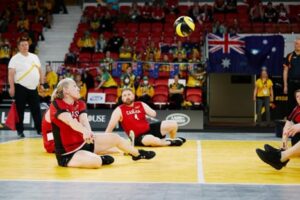With the 10 year anniversary of the Invictus Games founding approaching and with the Invictus Games Vancouver Whistler 2025 less than a year away, True Patriot Love reached out to former Team Canada alumni for their reflections on the Invictus experience and to find out where they are now.


Chief Petty Officer 2nd Class Marcy Dumonceaux participated in the Invictus Games The Hague 2020/22.
What memory from your Games stands out for you?
I have two memories: first, the memory of playing sitting volleyball, which was probably the most fun I’ve ever had before. I never laughed so hard. I was with some amazing teammates; I was the weakest link but they never gave up on me with my inability to play that well. I felt like part of a team, something that I was missing over the years of serving. Team cohesion, feeling safe and belonging are important in our line of work. The second memory is successfully completing all my swimming events and going on to finish last in finals. My biggest fears were not diving off the starting block and finishing last. But once at the Games, I realized doesn’t matter where you finish, as long as you finish.
What did Invictus mean to you?
Invictus, to me, is life changing. It is a state of being: being able to know you can accomplish anything you put your mind to, no matter what. Invictus provides not only the “how” to move on from any mental or physical challenges, but also a community where you are your authentic self, and fully supported with zero judgment.
What advice would you give Team Canada 2025?
My advice to the new members of our Invictus Family (AKA Team Canada), is to embrace every moment: there is no other time or place than at the Games where you will be able to be your true self. Cheer on your team, cheer on the other nations and, most of all, cheer on yourself. While team cohesion is very important and sharing the experience with your support people, ensure you take time to self reflect. Everyone will be at different stages of their healing journey so try not compare yourself to anyone else but yourself. Set those personal bests and goals but don’t be afraid to make adjustments if required. Remember not to be hard on yourself. Finally, just live in the moment – there will be professional photographers and many friends and family taking pictures to share with you. These are your Games, your moments, your healing journey. Just have fun, remember there will be laughter, fears, triggers, pain, joy, love, lots of support – and be prepared for some tears. You got this!
What did you learn about yourself while training and when competing?
Training during COVID and joining the team six months pre-Games were difficult. I had to face many triggers and try to overcome them. I wasn’t an athlete before the Games and was very hard on myself trying to prepare. I wasn’t able to take part in the training camps and had no idea what to expect. Competing was mentally and physically challenging, but with the help of the team, the coaches, the medical support, I completed all I set out to accomplish. I don’t think I would have competed in my swimming event if it wasn’t the support. I owe so much to Team Canada 2020 (2022) for my personal growth.
How does your life look different now than it did before you went to the Invictus Games?
My life is more active, with a new understanding of how to make adaptations to activities. I feel more positive about myself, knowing that I faced many fears mentally and physically. My new knowledge on adaptive sport helped me along my journey. Prior to the Games if I had an ache or injury I would just feed into the pain. Now I find ways to still be active even if I can’t accomplish the activity 100 percent. Developing a torn rotator cuff after the Games didn’t keep me from the things I loved to partake in to stay active. When I rowed, if the pain became unbearable, I could switch to rowing with one arm. While swimming, I would put the ego away and only swim breaststroke, or one-arm freestyle and adjusted my distance. I took up more walking and hiking to keep up my cardio. Finally, understanding I don’t have to be perfect all the time, and follow my new mantra: being perfectly imperfect is OK, as long as I don’t give up.





